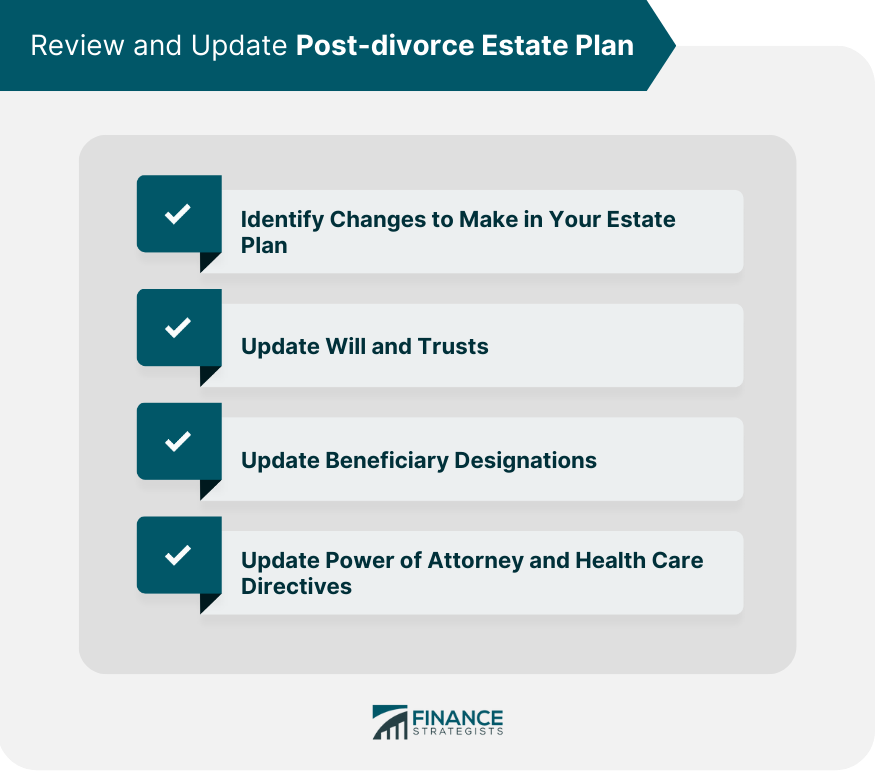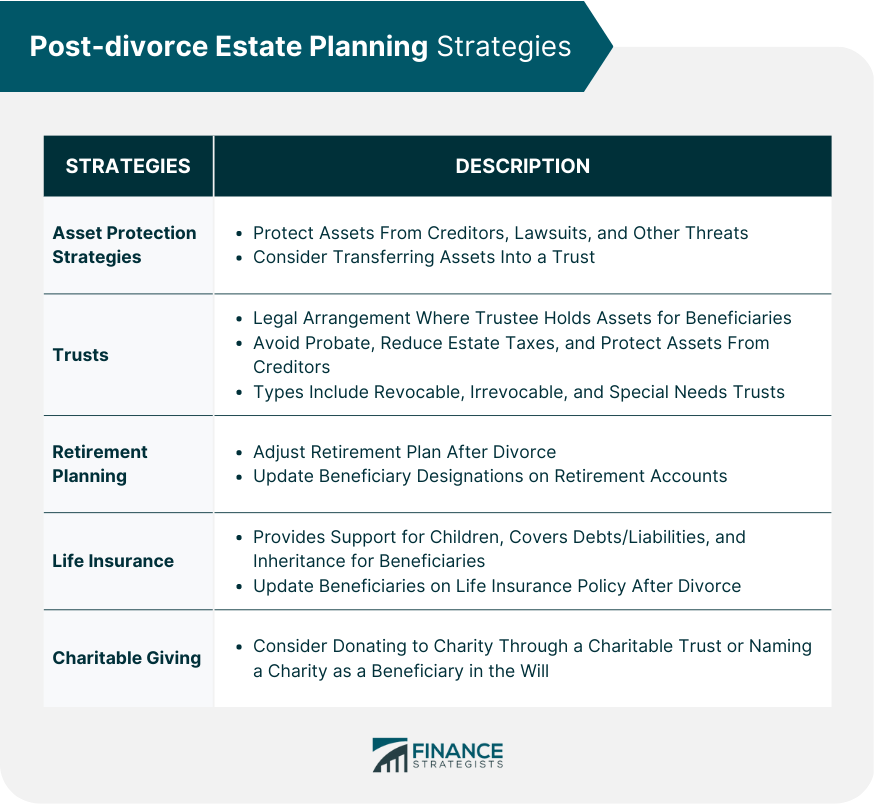Post-divorce estate planning involves reviewing and updating your estate plan, protecting your assets, ensuring that your legacy is protected, and creating a new plan that reflects your new life. Divorce can be a difficult and overwhelming process, leaving you with the need to start over and rebuild your life. While you may focus on immediate concerns, such as child custody, support, and division of assets, it's important not to overlook long-term planning for your estate. The first step in post-divorce estate planning is to review and update your existing estate plan. After a divorce, many of the documents in your estate plan may become outdated or invalid. The following sections will guide you through the key steps to update your estate plan. After a divorce, you will need to update your estate plan to reflect the new changes in your life. Some of the key changes to consider include: 1. Update Your Will and Trusts: Your will is a legal document that outlines your wishes for how your assets will be distributed after your death. After a divorce, you will need to update your will to remove your former spouse and any references to them. If you have a trust, you will need to update the trustee and beneficiaries as well. 2. Update Beneficiary Designations: You will need to update the beneficiaries on any accounts or policies you may have named your former spouse as a beneficiary. 3. Update Power of Attorney and Health Care Directives: You may need to update your power of attorney documents to ensure that your former spouse is no longer authorized to make financial or health care decisions on your behalf. When updating your will and trusts, there are a few things to keep in mind. First, you will need to update your beneficiaries. You may also want to update your executor, the person who will be responsible for carrying out your wishes. If you have minor children, you will need to name a guardian to care for them in the event of your death. It is important to review all of your beneficiary designations after a divorce. You will need to update the beneficiaries on any life insurance policies, retirement accounts, or other accounts that name your former spouse as a beneficiary. If you have not named a contingent beneficiary, you should do so now to ensure that your assets are distributed according to your wishes. You may have named your former spouse as your power of attorney or health care agent, granting them the authority to make decisions on your behalf if you are unable to do so. Updating these documents to remove your former spouse and name a new agent is important. Several estate planning strategies can be particularly useful for divorced individuals. These strategies can help protect your assets and legacy, ensuring your wishes are fulfilled after your death. Asset protection strategies can help protect your assets from creditors, lawsuits, and other threats. One common strategy is to transfer assets into a trust, which can offer greater protection than holding assets in your own name. A trust is a legal arrangement in which a trustee holds assets for the benefit of one or more beneficiaries. Trusts can be used to avoid probate, reduce estate taxes, and protect assets from creditors. There are many types of trusts, including revocable, irrevocable, and special needs. Retirement planning is critical for individuals who have been through a divorce. After a divorce, you may need to re-evaluate your retirement plan and make adjustments to ensure that you are still on track to meet your financial goals. You may also need to update your beneficiary designations on your retirement accounts. Life insurance is another important estate planning tool for divorced individuals. Life insurance can support your children financially, cover any outstanding debts or liabilities, and provide an inheritance for your beneficiaries. After a divorce, you may need to update your beneficiaries on your life insurance policy. Charitable giving is another important estate planning strategy that can benefit both you and your favorite charities. You may want to consider donating a portion of your estate to charity, either through a charitable trust or by naming a charity as a beneficiary in your will. If you have children, estate planning becomes even more important after a divorce. You will need to consider their custody, support, education needs, and any special needs planning that may be required. If you have minor children, you will need to name a guardian in your will to care for them if you die before they reach adulthood. You may also need to consider custody arrangements, including legal and physical custody and visitation rights. Child support is another important consideration for divorced parents. You will need to ensure that your children are financially supported and that their education needs are met. This may involve setting up a trust or other financial arrangement to provide for their education and other expenses. If you have a child with special needs, you will need to take special care when creating your estate plan. You may need to set up a special needs trust to provide for their care and ensure they receive the benefits they are entitled to without losing access to government benefits. If you own a business, estate planning becomes even more complex after a divorce. You will need to consider business succession planning, asset protection, and other issues that may arise. If you own a business, you will need to create a succession plan to ensure that your business continues to operate smoothly after your death. This may involve naming a successor or creating a buy-sell agreement with your business partners. Asset protection is particularly important for business owners. You may need to transfer ownership of your business to a trust or create a limited liability company (LLC) to protect your personal assets from business liabilities. A buy-sell agreement is a legal agreement between business partners that outlines what will happen if one partner dies or becomes incapacitated. This can help ensure that the business continues to operate smoothly and that the surviving partners receive the value of their partner's interest in the business. Post-divorce estate planning can be complex and overwhelming, but it is an essential step to protect your assets and your legacy. It is important to seek professional guidance from an experienced estate planning attorney and financial and tax advisors to ensure that your estate plan reflects your new life and goals. By reviewing and updating your estate plan, considering your assets, and taking steps to protect your legacy, you can ensure that your loved ones are cared for and that your assets are distributed according to your wishes after your death. Remember, by creating a solid estate plan, you can provide peace of mind for yourself and your loved ones, knowing that your assets will be distributed according to your wishes and that your legacy will be preserved for future generations.What Is Post-divorce Estate Planning?
Reviewing and Updating the Post-divorce Estate Plan

Identifying Changes to Make in Your Estate Plan
Updating Your Will and Trusts
Updating Beneficiary Designations
Updating Power of Attorney and Health Care Directives
Post-divorce Estate Planning Strategies
Asset Protection Strategies
Trusts
Retirement Planning
Life Insurance
Charitable Giving

Post-divorce Estate Planning for Families With Children
Guardianship and Custody
Child Support and Education Planning
Special Needs Planning
Post-divorce Estate Planning Considerations for Business Owners
Business Succession Planning
Asset Protection for Business Owners
Buy-Sell Agreements
Final Thoughts
Post-divorce Estate Planning FAQs
Post-divorce estate planning involves reviewing and updating your estate plan, protecting your assets, ensuring that your legacy is protected, and creating a new plan that reflects your new life after a divorce.
Post-divorce estate planning is important to ensure that your assets are protected and your legacy is preserved. Without proper planning, your assets may be distributed in ways that do not reflect your wishes, and your loved ones may not be cared for after your death.
The key considerations for post-divorce estate planning include updating your will and trusts, updating beneficiary designations, updating power of attorney and health care directives, protecting your assets, and considering special needs planning for children.
An experienced estate planning attorney can help you navigate the complexities of post-divorce estate planning, identify key issues, and create a plan that reflects your new life and goals. They can also provide guidance on asset protection, tax planning, and business succession planning.
It is best to start post-divorce estate planning as soon as possible after a divorce to ensure that your estate plan reflects your new life and goals. It is never too early to start planning and waiting too long can result in missed opportunities to protect your assets and your legacy.
True Tamplin is a published author, public speaker, CEO of UpDigital, and founder of Finance Strategists.
True is a Certified Educator in Personal Finance (CEPF®), author of The Handy Financial Ratios Guide, a member of the Society for Advancing Business Editing and Writing, contributes to his financial education site, Finance Strategists, and has spoken to various financial communities such as the CFA Institute, as well as university students like his Alma mater, Biola University, where he received a bachelor of science in business and data analytics.
To learn more about True, visit his personal website or view his author profiles on Amazon, Nasdaq and Forbes.











